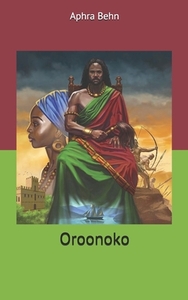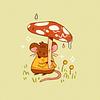Take a photo of a barcode or cover
adventurous
challenging
dark
emotional
sad
tense
medium-paced
Plot or Character Driven:
A mix
Strong character development:
Complicated
Loveable characters:
Yes
Diverse cast of characters:
Yes
Flaws of characters a main focus:
No
dark
sad
medium-paced
Plot or Character Driven:
A mix
Strong character development:
No
Loveable characters:
Complicated
Diverse cast of characters:
Yes
Flaws of characters a main focus:
No
That was the single most horrifying ending to a book that I've read in a long time.
I had my doubts about how a white woman in the 17th century would portray an African man, and it's not all rosy. Oroonoko is only beautiful because he has European traits, like a Roman nose. His noble qualities draw from European epic and romantic conventions. Compared to him, though, Behn's white male characters are scum. And unlike many literary heroes, Oroonoko is a dynamic character: he starts off trusting everyone, and by the end, his blood boils for revenge.
I was honestly so turned off from Behn while I read The Rover, but I have newfound respect for one of England's first professional female writers. The plot may be simple, but there's so much so untangle. It's definitely not all black and white.
I had my doubts about how a white woman in the 17th century would portray an African man, and it's not all rosy. Oroonoko is only beautiful because he has European traits, like a Roman nose. His noble qualities draw from European epic and romantic conventions. Compared to him, though, Behn's white male characters are scum. And unlike many literary heroes, Oroonoko is a dynamic character: he starts off trusting everyone, and by the end, his blood boils for revenge.
I was honestly so turned off from Behn while I read The Rover, but I have newfound respect for one of England's first professional female writers. The plot may be simple, but there's so much so untangle. It's definitely not all black and white.
slow-paced
dark
reflective
sad
fast-paced
Plot or Character Driven:
A mix
Strong character development:
Complicated
Loveable characters:
Complicated
Diverse cast of characters:
Yes
Flaws of characters a main focus:
No
This is a very interesting little book. It's a bit, uh, outdated when it comes to views towards slavery, but when you read it knowing that, it's a pretty good story. Behn's perspective on the practice of slavery is an interesting one both for our time and her own. The thesis appears to be that slavery is okay, but it shouldn't be racially based, which isn't a perspective you hear often. I am glad I read it to see that type of historic viewpoint on the issue.
Graphic: Death, Racial slurs, Racism, Sexual assault, Slavery, Murder
dark
tense
slow-paced
Plot or Character Driven:
Plot
Strong character development:
No
Loveable characters:
No
Diverse cast of characters:
Complicated
Flaws of characters a main focus:
No
adventurous
dark
informative
sad
tense
medium-paced
Plot or Character Driven:
A mix
Strong character development:
Complicated
Loveable characters:
Complicated
Diverse cast of characters:
Yes
Flaws of characters a main focus:
No
Graphic: Racism, Self harm, Violence
dark
emotional
tense
slow-paced
Plot or Character Driven:
Plot
Strong character development:
No
Loveable characters:
No
Diverse cast of characters:
Yes
Flaws of characters a main focus:
No
My full review on BookNest - BookNest - Oroonoko
Virginia Woolf said Oroonoko was the first novel. What makes the context of this story even more remarkable is that if we agree with this, then the first novelist was a woman, written in the late 17th century.
“A poet is a painter in his way, he draws to the life, but in another kind; we draw the nobler part, the soul and the mind; the pictures of the pen shall outlast those of the pencil, and even worlds themselves.”
It is a story told in an almost biographical manner about Prince Oroonoko, who lived in the Caribbean Islands, and whom the author was in awe of. Behn forms his character with a sense of realism despite his idealised nature. He is the symbol of honour and deserves respect of all. But unto this he is stripped of his rank and taken as a slave. Yet he maintains his integrity and the impression of his personality on all he meets.
A particular favourite aspect of mine in this read was the romantic thread, which I do not often say. Unlike so many stories I have read, it appeared natural, despite also being idealised The way Behn implemented this into the story gave the story a humanity that was needed for a connection to be made with Oroonoko.
The prose of Behn does not focus on emotive language, but rather tells the story of what is happening in a factual, fluid and immersive manner, which cleverly presented the setting and culture and characters of all parties so effectively.
But, Oroonoko is a product of its time, especially with the topic of colonialism. Behn appears to show two opinions on slavery. By having slavery as the means in which Oroonoko is tragically stripped from his power, It is projected as barbarous and a tool of injustice, but paradoxically Behn shows support by depicting its importance in sustaining the British Empire that is heralded as a great ideal.
“Where there is no novelty, there can be no curiosity"
The fact that Oroonoko was inspired largely by true facts and then idealised and romanticised added an extra does of realism into this novel, but also made it even more interesting. In this multifaceted novel, we are introduced to an inspiring and evocative story, memorable characters of both a loveable and hatable disposition, and the fluid prose of Aphra Behn. A short, thought-provoking read.
4.5/5 STARS
Virginia Woolf said Oroonoko was the first novel. What makes the context of this story even more remarkable is that if we agree with this, then the first novelist was a woman, written in the late 17th century.
“A poet is a painter in his way, he draws to the life, but in another kind; we draw the nobler part, the soul and the mind; the pictures of the pen shall outlast those of the pencil, and even worlds themselves.”
It is a story told in an almost biographical manner about Prince Oroonoko, who lived in the Caribbean Islands, and whom the author was in awe of. Behn forms his character with a sense of realism despite his idealised nature. He is the symbol of honour and deserves respect of all. But unto this he is stripped of his rank and taken as a slave. Yet he maintains his integrity and the impression of his personality on all he meets.
A particular favourite aspect of mine in this read was the romantic thread, which I do not often say. Unlike so many stories I have read, it appeared natural, despite also being idealised The way Behn implemented this into the story gave the story a humanity that was needed for a connection to be made with Oroonoko.
The prose of Behn does not focus on emotive language, but rather tells the story of what is happening in a factual, fluid and immersive manner, which cleverly presented the setting and culture and characters of all parties so effectively.
But, Oroonoko is a product of its time, especially with the topic of colonialism. Behn appears to show two opinions on slavery. By having slavery as the means in which Oroonoko is tragically stripped from his power, It is projected as barbarous and a tool of injustice, but paradoxically Behn shows support by depicting its importance in sustaining the British Empire that is heralded as a great ideal.
“Where there is no novelty, there can be no curiosity"
The fact that Oroonoko was inspired largely by true facts and then idealised and romanticised added an extra does of realism into this novel, but also made it even more interesting. In this multifaceted novel, we are introduced to an inspiring and evocative story, memorable characters of both a loveable and hatable disposition, and the fluid prose of Aphra Behn. A short, thought-provoking read.
4.5/5 STARS





